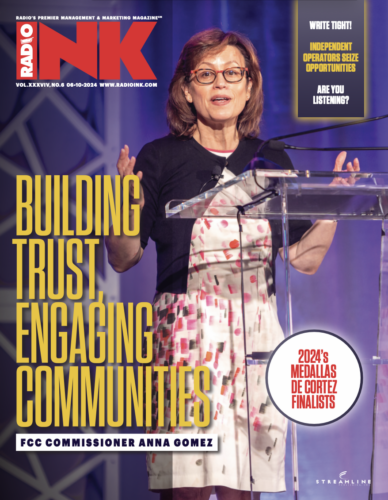
(By James Bahm) What is your job? What does your job entail? What are your job day-to-day tasks? Since you’re reading this in Radio Ink, I’ll presume that you are in sales of some capacity (digital, terrestrial, agency, or leadership therein), and if you’ve been in your role for some time you’ve most likely developed a personal approach to communication – a method to your madness, so to speak.
But how effective is it, really?
When I started in radio in the early ’90s, the approach I was taught was to open the Yellow Pages (remember flipping through those from back to front?), pick out twenty businesses in each category, and call on them, saying you, “Only want to take a few minutes and talk about your business with no interest in selling you anything while I’m there.” Or some variation thereof.
That approach, while being the primary one taught at the time, is woefully inefficient today. A couple of internet searches can yield dozens of prospects in various categories for which you’ll have to do a deep dive on each to learn more about them. Point being, you can learn so much about dozens of businesses in a few hours that you can generate a VBR (Valid Business Reason) for them to meet with you for an initial CNA (Customer Needs Analysis).
This means you can do more prospecting on your laptop in a couple of hours allowing you to eliminate as many prospects as you decide to pursue, possibly eliminating more than you pursue.
Let’s look at a few practical ways to create the foundation for a process to give bona fide prospects a reason to be more likely to do business with you:
Start With Your Own Station/Cluster
This process should ideally create exceptional value for your team members and customers alike. Yes, a solid sales process starts with taking care of each person on your team, whether it’s replying to emails from interns, on-air talent, or anyone else, or giving new hires more than a few months to gain traction. I’ve also seen coworkers who never reply to emails asking for help with an account or seeking advice on creative.
I’ve also seen some places give new hires who moved across the country to take the position a month or so to achieve success without giving them a few house accounts on which to build their book of business. If one of the trends you (and/or your team) notice is high turnover and a constant need to leave job postings online, regularly announcing in meetings that you are looking for anyone they want to refer to the company for a position, then the cause of this revolving door syndrome is you and/or the leadership creating the environment.
In full disclosure, I know stations like this are the exception and not the norm; however, they do exist, and their toxicity must cease.
Timely Responses and Anticipate Customer Needs
I am amazed at how many customers tell me that their biggest complaint is that their rep doesn’t communicate with them, provide updates, or share solutions that address their questions and reduce their stress.
When I was with Tesla, there were countless times that customers would thank me for not only answering their questions within a day of receiving their text or email but also addressing issues before they arose. Unfortunately, this is not exclusive to the energy/auto industry. Broadcast, legal, healthcare, and other industries are rife with a lack of communication.
Don’t just take my word for it:
Tolero Solutions: “53% of people said unclear communication is the reason for a bad customer experience.”
Emailgistics says these are the top 6 customer complaints: Poor Listening Skills. Language Barriers. Lack of Clarity. Poor Tone. Delayed Response Time. Lack of Empathy.
Zoom Careers lists inadequate communication as one of the common customer complaints.
How do I anticipate customer needs? You may ask, and it’s a good question. Don’t just answer the question the customer is asking; answer the next few questions the customer will ask once they receive your reply. Time and experience will give you insight into this.
For example, if a customer asked me how long it would take for their solar panels to be installed, I could answer, “90 days on average,” but instead I answered it this way:
“Once the design is finalized, our local permit coordinator will submit our application to your town, and approval can average two-to-five weeks (If there are no delays, which I’ll touch on in a moment); then, once we obtain permits, the local utility coordinator will submit for utility approval and this averages five-to-nine weeks if there are no delays.”
“Permitting and utility delays can come from a range of factors outside our control that include the township changing their requirements, to the utility initiating delays due to internal factors we have no control over. I will relay any delays should we encounter them and keep you abreast of developments throughout. Once all permits and approvals are received, our scheduling coordinator will call to get the installation on the calendar.”
In broadcasting that could be providing a detailed explanation of how long it takes for their commercial to air. If your station mandates all new customers must pay in advance, explain this upfront. The sooner you disclose everything, the less of an issue it becomes. Be sure to disclose accurate timelines for script writing and production completion, talent fees, and timelines for all digital creative approvals as well as timelines for the creative to be deployed.
The territory I covered with Tesla depended on the division I was assigned to, and it was not fewer than eight states and not more than the entire US. My timeline to respond to emails and texts was 24-48 hours, not including weekends and holidays. I averaged between 50-80 customer emails a day, in addition to an average of four to six hours making outbound calls. The amount of clients you have between the local-direct market and agencies should mandate a response to emails/voicemails to no more than the next business day, depending on when the email/voicemail was received.
There are more steps to developing a process which I’ll cover in the next couple of columns. I’ll close with a paraphrase of a Michael Jordan quote where he said if I practice harder, the games are easier. Have the discipline to start communicating better with your customers – and with your coworkers, because you’re not that busy – and you’ll start to not only close more deals, but you’ll also likely get more referrals because you’re going to retain more customers.
Bottom Line: Once you have a solid process in place to do your job, you’ll accomplish so much more than you could’ve imagined.
James Bahm has more than 30 years of experience in broadcasting, sales and marketing, and recruiting and hiring. He is the author of Don’t Yuck My Yum – a Professional Development and Sales & Marketing book. Reach him via email. Read James’ Radio Ink archives here.








Terrific column as always! I only wish more of the people tasked with selling to me would internalize and execute against these insights.